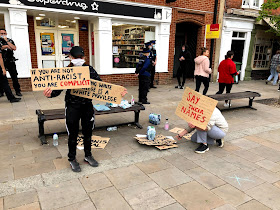 |
| Protesters in Henley-on-Thames |
Occasionally, when I read about the horrors in the world, I tell my kids we won the lottery. By that, I mean we live in a liberal democracy, we're well off, educated, healthy and happy. My children and husband have mixed heritage (a few Chinese genes) but essentially we are the beneficiaries of 'white privilege'. I try not to take all this good fortune for granted. To paraphrase the American professor Brené Brown: when you feel grateful for what you have, you understand the magnitude of what other people have not.
Watching the #BlackLivesMatter protests mushroom across the U.S. and the U.K. brought this home to me once again. Last night, I sat down and viewed the clip of George Floyd gasping for breath. I didn't want to watch it, but felt I needed to confront the reality of racism, the insidious threat that so many other people face.
'He could die from that'
British politicians have argued our police forces are not guilty of the same prejudice, having undergone reforms in the wake of the Macpherson report (resulting from an enquiry into the murder of Stephen Lawrence in April 1993 - our own George Floyd moment).
In 2014, I went to listen to Stephen's mother, Doreen Lawrence, Baroness of Clarendon, speak at the Henley Literary Festival. Re-reading my own blog post about her talk, I was shocked to recall how Baroness Lawrence had recently witnessed an incident at London Bridge station where a group of white police officers were kneeling on the body of a young black man. She intervened and warned them: "He could die from that, you know." The officer, who did not recognise her, replied, "It happens."
There is no room for complacency. We all need to be on our guard. Having said that, it's hard sometimes to know what to do. Barack Obama believes that if we're to tackle unequal justice, there is a place for protest and raising public awareness. However, he also makes the point that "eventually aspirations have to be translated into specific laws and institutional practices - and in a democracy, that only happens when we elect government officials who are responsive to our demands".
Sajid Javid, the former Chancellor, also provides a useful checklist for challenging racism in the U.K. in his recent comment piece for The Sunday Times. Top of the list was the need for the Home Office to implement "root-and-branch cultural change" in the wake of the Windrush scandal.
I used Mr Javid's article as a crib when I wrote to my local Conservative M.P. John Howell earlier this week, urging him to agitate for change on my behalf. We can only hope that the spectacle of placards and protests, combined with a steady drip-drip of grassroots pressure will eventually bring about a shift in culture. Ultimately, we need our leaders to listen and implement those reforms. And, if they don't, we need to vote for those who will.
You might also like to read:
The quiet determination of Doreen Lawrence
No comments:
Post a Comment